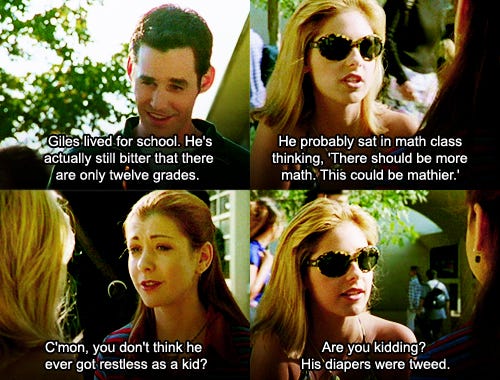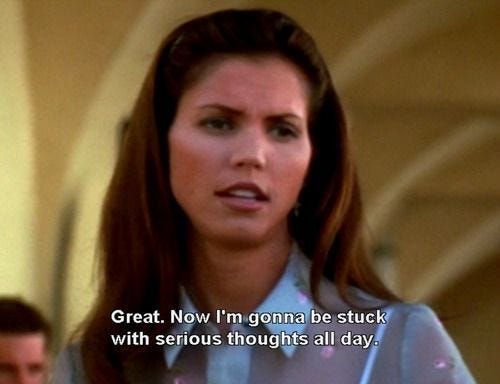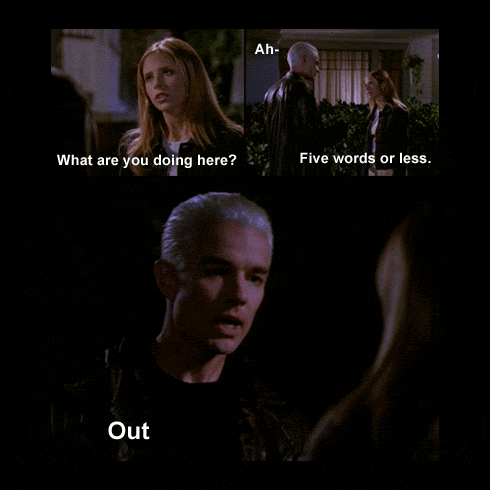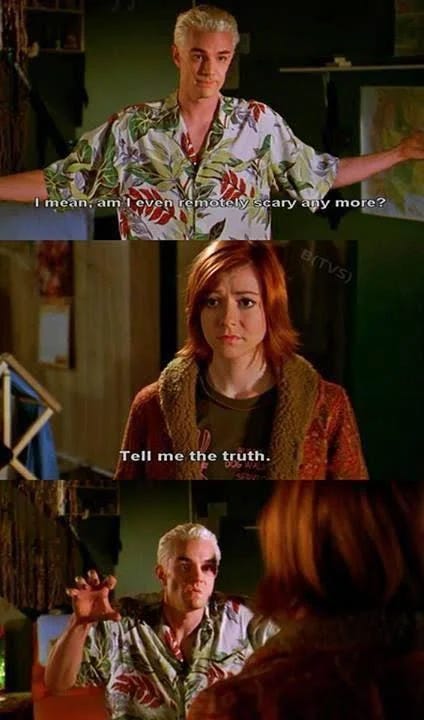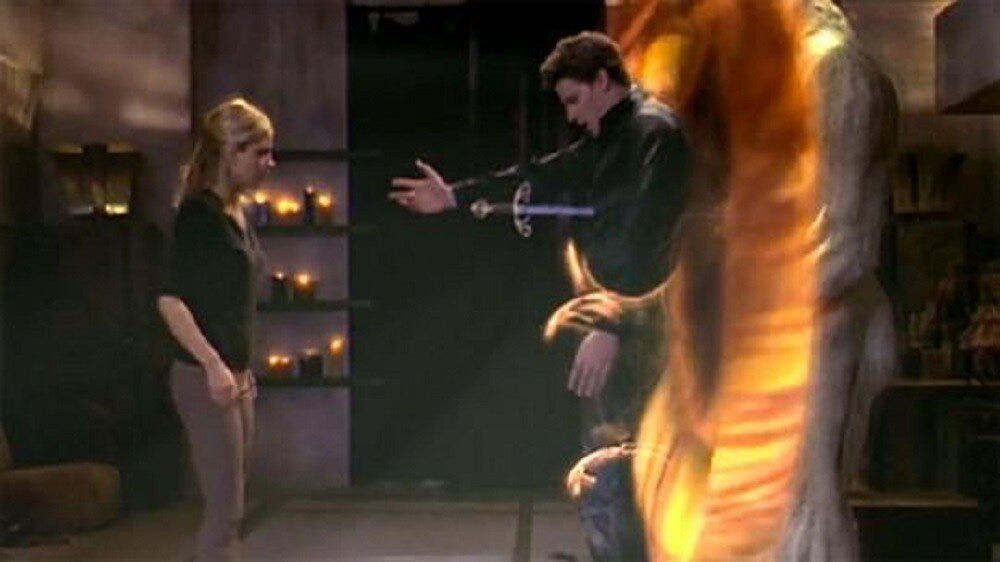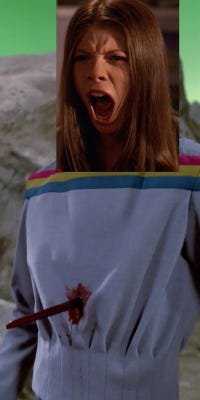The 2021 Buffy the Vampire Slayer Review
Digging up the grave of dated TV shows
I’d like to say I’m not picky with what I watch, but I can’t lie: those who know me know I have a type. Urban fantasy vampire romance isn’t it. They may wonder, then, why willingly watch Buffy the Vampire Slayer (1997)? The answer comes twofold:
It was a cultural touchstone of the late 90s and 00s that I knew nothing about, and, by watching it, I could learn about fandom subgroups I’ll never have contact with.
Allegedly, good Buffy fanfiction exists.1
So, when I came into possession of a free streaming account and the opportunity to watch an episode once in a while while having dinner instead of a documentary or something useful, I decided to go all-in.
All-in meaning one hundred forty-four forty-two-minute episodes. It took a year.
Let’s kick off the review and put this show in the ground.
Epistemic status: I haven’t watched Angel and have purposefully avoided all production trivia. I know nothing beyond the realm of the fictional, except that Joss Whedon (Firefly, Cabin in the Woods, Dr. Horrible’s Sing-Along Blog, nothing else good) was the showrunner.2
The plot
Buffy Summers, a fifteen year old girl, is the chosen one. Her destiny: slaying vampires to keep humanity safe, which will forever keep emerging from the ground (the vampires, not humanity), until she dies. She’s the latest in a line of chosen ones throughout the ages, all young women because either Joss Whedon is an alleged weird sex pervert, or because 1997 girl power. One of those.
She doesn’t know any of this. After burning a building down to kill off a bunch of draculings, she’s expelled from her high school and is forced to move with her mother to Sunnydale, California. There, she meets Giles (a stodgy Watcher-librarian3), Xander (comic relief quip-man) and Willow (she-nerd who definitely writes ancient TV show reviews for an audience of five).4
Giles soon tells Buffy about her destiny and her place in the world. There are witches (Wicca is a real magic anyone can learn, even men), demons, vampires (which are demons inhabiting a dead body),5 werewolves, and a bunch of weird shit that would perfectly contribute to a monster-of-the-week show, which is what Buffy will be for most of its runtime.
Giles will train Buffy in the Ways of Slaying while working as the school librarian. Turns out the high school - and indeed the entire city - is above The (later A, later The) Hellmouth, both a literal gate to the hell planes where demons come from and a nexus point that attracts all weirdest and evilest entities on Earth to it. Probably destiny6 that Buffy ended up there.
Throughout the series, Buffy meets vampires, has sex with vampires, fights demons, never has sex with demons, unless you count the demons inside the vampires, fights vampires, jobs7 to vampires and vampires the vampires. There are multiple potential world-ending events that only happen when it’s time for the end of the season. At one point, Willow fights a cyberdemon she met over the internet.
All of this is contrasted with teenage life, the fantasy often serving as a distorted mirror to the trials of adolescence, as it was surely pitched by Whedon to a boardroom of bored network executives. A girl who no one notices becomes invisible. A girl has a controlling mother who wants to live through her - only her mom is a witch, and takes over her body to do so literally. A clan of bullies is taken over by a group of body-jumping hyenas and people barely notice the difference. A cyberdemon thinks he has a real connection with a shy girl, only for her to brutally murder him as he achieves physical form.8
As the characters grow up, so do the storylines. Themes like rape, drug addiction, showrunners casting ten new twenty year old women every episode, accidental murder—they’re all mirrored by harsher fantasy threats. Hammy vampires all but get replaced by no-fun-allowed demons or humans who just want to see the world burn.
Throughout the show, Buffy, Willow, Xander and Giles9 fight evil (from ancient vampires, to an occultist mayor, to a nuclear powered army cyborg, to an evil Goddess, to three dorky supervillains) and have repetitive interpersonal drama. Other important supporting characters like Angel, Anya, Dawn, and Spike help them fight evil, or be evil depending on the episode.
The themes of sacrifice culminate in a finale where none of the main heroes die and everyone walks off into the sunset. Well.
Things I Liked
The dialogue
Buffy uses a stilted style of humorous speaking—the internet-famous Buffyspeak—throughout the series. Soon, other characters begin using it, even rarely villains. It makes things of the funny. There’s this rough guideline in comedy known to some as “no more than one joke per joke”10—essentially, you can’t both have funny dialogue and funny background situations occurring simultaneously, you need to know where to place the joke. Buffyspeak is a way to put background gags in the foreground, redefining the concept as a contorted way to talk, used as a way to break up awkward, dramatic or overly serious-sounding lines and exposition and keep things light. Many claim it makes the dialogue sound timeless, and I wholeheartedly agree.
And the dialogue is often funny without buffyspeak, too.
I can guarantee that without it, the show would be unwatchable.11 It’s a funky layer of technicolor paint covering giant red flags.
Cordelia
Just imagine the dumb popular high school bully character joining the heroes without significantly changing her personality. She caused a lot of funny situations and saved Xander from becoming the constant butt of the joke, which was his cross to bear all throughout the early seasons.
And, damn it, she just leaves for the spinoff Angel right as she’s really getting good. It keeps happening.
The musical episode
I quite like musicals, and Once More, with Feeling is actually a surprisingly effective, if weirdly placed12 instance of a musical episode.
I don’t have any particular things to say about it. I just thought it was neat.
Anya
Anya is originally a monster-of-the-week, a “vengeance demon” that grants wishes to heartbroken girls, wishes of the “I wish they never existed” variety. She must have really impressed the showrunners, as, once she becomes human, she slowly joins the cast and ends up almost marrying a main character.
She has trouble acting human, and falls into the role of a character who always says what the audience is thinking,13 even if it unwittingly hurts people’s feelings.14 Often, she admits characters are contradicting their established motivations, or that the current plot of the week makes no sense.15
To continue a theme, her character eventually kind of crashes into a wall, once her wedding with Xander is cancelled. However, even after banging Spike16 and saying goodbye to being untouched by the whims of shitty writing, she still says some funny stuff once in a while, and doesn’t actively bring other plots down with hers. In a show like this, it makes her a great character by default.
Continuity
I think almost every episode gets a callback, some multiple ones. This applies from the most important season finales to episode six of season one.
I think it’s pretty cool, especially for a show of its time. Guest stars are never forgotten and sometimes become important characters multiple seasons later. This in addition to its seasonal arcs (each with its main villain or villains and Real Life Theme), which I believe were a rarity at the time.
It comes with its dangers, though, because one of the issues of continuity is that every power and threat displayed must be assumed to still be a factor. The writers struggle with this, especially with Willow’s abilities, which have gone through three different nerfs by the end of the show.
Overall, though? A legitimate positive that many shows should learn from.
Spike
He’s just this crass British guy with a The-2000s-Boyband hairstyle who doesn’t actually give a fuck about good or evil, and he just hangs out in his evil lair under a mausoleum. He’s not really affably evil,17 more like dickish evil? Some decent acting by James Marsters turned a random generic vampire into a highlight of many episodes.
Things I Hated
Spike
Of course, nothing good ever lasts. The Buffy Flip-flop (see below) affected him as he affects all good things. First, he was evil. Then, he was good. Then he was goodly evil. Then he was evilly good. Then he was good, but crazy. Then he was good, but boring.
Most of all, I think he was a victim of popularity. Producers love keeping a popular character around, even if it tasks the writers with coming up with increasingly contrived justifications for a murdering vampire to hang out with a bunch of kids.
The ultimate solution? He has a chip in his brain that makes him safe to her and his friends. No, don’t ask for that chip to be weaponized, that’d be too sensible. This is just an Excuse Chip. Also, he falls in love with Buffy so he has a reason to actively seek her out.18
He’s barely Spike at that point. He becomes a plot device, always acting irrationally to move the plot forward, or more often, back-and-forth. His romance with Buffy was originally surprising and novel, but quickly became a boring, repetitive soap opera in which none of the participants act like humans (wow, how clever of the writers!).19
Another “good vampire”, Angel, was boring but inoffensive. Spike became the walking manifestation of shrugging writers. Remember Poochie from The Simpsons? Yeah, basically that, but with a whole lot of annoying lampshading20
Lampshading bad things and still doing them
As a topical example, Xander and many other characters ask the question, “why is Spike allowed to live after he murdered multiple people with no regrets, while we behead villains-of-the-week for a single murder attempt?”.
The answer, of course, is outside of the story. The showrunners want him to stay on the show because he’s popular.
But you cannot bring it up in the show and then not give a satisfactory answer inside of the story. You’re providing meta-humor, yes, but at the cost of immersion and reminding the audience that no good, consistent writing will ever be allowed as long as it conflicts with the realities of american television. You can’t have your cake and eat it too, writers.
I think both the mainstream audience and I would have actually tolerated the shitty parts more if we weren’t constantly reminded of them. One particular example sticks out: in the final season, Buffy is called out for making too many vacuous cringeworthy speeches, as a joking lampshadey comment, of course. In the following episodes, Buffy continues making speeches in a way that makes it obvious the writers thinks it’s really cool for her to be taking charge this way.21 But they also think the previous joke was funny? Which is it? I don’t fucking know.
This can work if your show is shameless shlock, but Buffy lost most of the shlock after season 4.
Losing most of the shlock after season 4
The truth is that if you want to ascend past bottom-of-the-bin shlock and truly be respected by critics, you need to have either skills or budget as your ladder. Tragedies continue to happen around creators not aware of this basic principle, like Space Cop, Cool and New Web Comic or the new Doctor Who.
Buffy never had the actors. I’m not really someone who often notices the nuances of acting, but Buffy Summers in particular has some of the worst I’ve seen in a network TV show,22 not that anyone else is particularly good. The writing? Some episodes have decent, even great scripts, but most of the time they’re using the writers that enjoy flip-flop relationship drama, or making Willow befriend a cyberdemon over the Internet. The budget? Come on, dude.
Regrettably, they decided to try anyway. Buffy is now fighting gods who murder people graphically on-screen. Buffy is now simultaneously having to raise a child and needing to find a job that will pay the bills. Xander decides he’s too fucked up to marry the woman he loves. Willow falls into evil drug addiction, becoming something of a cyberdemon herself.
This all happens with Buffyspeak. This all happens alongside low quality visual effects, terrible costumes, sitcom camera shots. It just doesn’t work. It’s a Cerebus-style slide into pretentious drama, culminating in the arthouse-episode-attempt The Body which is probably popular among the fans for all the wrong reasons.
The kinonarrative dissonance23 of low budget and arthouse delusions leads to approximately one eyeroll per episode from season four onwards. It never recovers.
Mandatory action scenes and ambiguous power creep
Probably another TV exec requirement, but it starts to get ridiculous by the end, wherein a fully trained Slayer still has trouble fighting a newborn vampire one-to-one, because fights need to both happen every single episode and be exciting, despite the audience being fully aware she’s not going to lose. Maybe I’m giving 1999 american audiences too much credit?
I never did, but maybe I should have just fastforwarded past what’s essentially filler. There are only so many interesting fights you can make happen with low budget and no interesting powers. Buffy can basically beat people up and do backflips, but harder than a regular human.24
Wait, back… flips?
The Flip-Flops
Buffy the Vampire Slayer is a story about flip-flopping.25
The plot. Buffy is initially said to be the lone slayer that will save humanity. Later, Buffy is implied to be merely one of many slayers, on one of many Hellmouths. Much later, no, she is The Slayer, everyone else is a Potential (with some weird edge cases like Faith), and the mention of other Hellmouths is quietly forgotten. In the final episode, they mention a single other Hellmouth in Cleveland, as transparent desperate sequel bait. The writers generally struggle keeping the world as small or as big as the plots warrant.
The characters. Xander goes from horny irresponsible teenager to responsible adult to irresponsible manchild to responsible adult to irresponsible manchild basically every season. Buffy has a ridiculous arc with so many loops and turns that it looks like a drunk person planned it. Actual paraphrasing: Buffy has “an inferiority complex about being better than everyone else”. It doesn’t even stick to that particular characterization, actually.
The romance. You know exactly the kind of thing I’m referring to, because it’s definitely not exclusive to this show.
Vampires? Merely demons who have taken over corpses, their original personalities only remaining by virtue of shared memories. They just want to be evil and ruin the world. But no, some vampires are actually basically just the person they were when living but evil. But no, there is actually no humanity in a vampire whatsoever, so murdering them is merely doing the world a favor. ACTUALLY, they’re just like us, they just change alignment from Lawful Good to Chaotic Neutral.
The entire show is like this. The writers never bring it to a conclusion, a single explanation, presumably out of an original desire to not write themselves into a corner. Nonetheless, the alternate interpretations of what exactly a vampire is continue to show up.
These flip-flops, soft retcons and other hack fraud writer techniques are omnipresent in Buffy the Vampire Slayer. I honestly struggle to understand how this show lasted seven seasons oh right hot vampires.
Dawn
This reminds me of an episode of Star Trek: The Next Generation.26
Oz
Imagine making a character whose gimmick is that he doesn’t talk much, but he’s also a genius rock star manlet in love who won’t shut up about how amazing one of the main characters is. Seth Green plays him (???).
He left the show pretty quickly, so he didn’t worsen it that much, but he stands out as a baffling character concept. He’s also a werewolf, which matters MUCH less than you might be imagining. You know, it’s kind of weird how the opening for all 144 episodes has a wolf howl in it but there are only three werewolf episodes.
Why not have a disgusting vampire hiss instead? Come on, producers.
The understandable yet cringeworthy times
Buffy was clearly a harbinger of LGBT-heavy shows. It was probably really cool at the time to have a main character being bisexual, but it was… a bit too early to actually tackle those subjects.
Viewers who watch the show nowadays will be understandably confused by a bisexual woman mentioning she “turned gay so she can’t like dicks anymore” (I’m barely paraphrasing here). They will be confused that it considers women kissing to be erotic fanservice to the point of making fun of the viewers for seeing it. They will definitely be confused that the early seasons use magic as an euphemism for being a lesbian when a witch later turns evil for using too much of it. That last one could start its own section of the review, broken aesops and mixed metaphors, because it was definitely not a lone example.
It’s just weird. It gives the impression of a neckbeard trying to impress his cool gay friends with how woke he is, an impression likely close to the actual truth. Again, it was definitely too early, and nigh every LGBT heavy scene has aged like milk.
The messy conclusion
Have you ever watched Avatar: The Last Airbender? I’m not going to spoil it for you besides saying that its ending is kind of ruined by revolving around a last-minute deus ex machina power-up.
Well, Buffy’s ending has at least THREE of those, and the rest of the show is definitely not thrice as good as Avatar. The writers just wanted a few cool battles and twists27, but didn’t want to work for them. No character arcs are completed except maybe Willow’s? No substance, all action and drama. Definitely doesn’t feel like a thematic climax, either28 The heroes leave Sunnydale with a smile on their faces, ready to become a multimedia franchise, except movies and TV shows because Buffy’s actress wanted to leave.29 I hear terrible tie-in books and comics are involved.
Also, Dracula gave Buffy his blood at the start of season five, which is the process to turn people into vampires, why didn’t Buffy turn into one when she died in season five? Missed opportunity there. She could be the vampire Slayer. COME ON, PRODUCERS. Actually, I’m sure this has got to be the premise of one of those good fanfics I mentioned at the start. I will update you guys in the second part of this revie—haha no let’s end this already.
The conclusive mess

All the above elements reverse-synergize to create a monster. My personal monster-of-the-year.
Sometimes, the many moving parts, conflicting lore and inconsistent writers led to something I could never expect and was actually novel. For example, Buffy is at one point replaced by a sexbot played by the same actress, as the original Buffy had died. I’m not just saying funny things, this actually happens. I was close to adding a Things I Liked section entitled ‘unpredictability’, but it’s far more often to the detriment of the story.
Most of the time, Buffy has enough rough edges you can never get fully into the show. You can’t even enjoy it for the B-movie atmosphere, because that goes away. If you’re in it for the characters, get ready for their turn to hold the Idiot Ball and become unlikable, sometimes permanently. If you’re in it for the plot, you’re a unicorn, soon to be an unhappy one.
Buffy the Vampire Slayer needed to stick to its comedic strengths and end within two or three seasons, but instead it became a vampire, a melodramatic annoyance that refused to die.
Wait, I forgot to talk about Faith—31
People who should watch this show: pop culture historians, “I can fix him” romance fans, Whedon fanatics, reviewers who want to avoid time paradoxes.
People who shouldn’t watch this show: enjoyers of good stories, /r/rational users, busy folk, horror lovers, healthy romance lovers, Cinemasins, most.
This review was not sponsored by Skillshare OR Audible, which I consider a massive personal achievement.
I haven’t yet tested this hypothesis.
After typing that, I googled it and learned he left that position five seasons in. That actually explains a lot, and it’s exactly why I wasn’t looking things up. Let my opinions stay fresh and untainted, damn it!
Watchers are essentially the Jedi Masters to Slayer Padawans, but British.
If you’re not going to watch the show and haven’t read another book, you can safely assume the Buffy:Xander:Willow dichotomy is equivalent to the Harry Potter:Ron:Hermione one.
But which also have the guy’s memories, but also despite being demons they can be indistinguishable from the original—we’ll get to this later.
Abrams, J. J. (2004). Lost. ABC Network.
If you don’t know what jobbing means, check out this Star Trek BBS thread.
That last one is a prescient mirror to the incel (infernal celibate) movement.
They refer to themselves as the Scooby Gang at multiple points, but I think the name is stupid so I won’t use it.
Brothers, Zucker. (2019). Top Secret - re:View with Jay Baumann and Colin Cunningham. Red Letter Media.
More so.
Right in the middle of season 6, well past the point where it would work holistically.
I’m aware I later complain about lampshadey jokes, but her lines stand out in working pretty well within the story.
I think she’s also the kind of character that, would Buffy air today, would be deemed autistic-coded by the fans. I, for one, am happy Buffy isn’t airing today.
As the zoomers say, we stan.
No, context doesn’t help.
The season 3 villain actually is the trope picture for Affably Evil, however.
I have determined this decision alone made Joss Whedon 5.6 billion dollars.
That's what happens when a relationship makes no sense, it's only initially original and surprising. Unfortunately, they couldn't figure out what to do with it other than each member taking turns to toxic-ly use the other, culminating in a rape attempt, which I don't really want to address in detail.
“What’s your final judgement on Spike?” I don’t fucking know. I couldn’t even tell you if the show would be better without him in it. He’s almost a different character in every season.
Buffy is a very inconsistently written character. I like her most when she’s played as a vulnerable teenager way over her head and aware of it, but in Season 7 they really floored the “gatekeep girlboss” gas-pedal. At least there are consequences and she gets Captain America: Civil War (2016)ed over it.
As said above, she's only convincing when she plays an insecure pouty teenager, outside of that she has trouble being believably sad, angry or badass. This is extremely hard to express in a review without just using clips, so take my word for it. I wouldn't say her acting gets worse, but the show gets more demanding and it makes it more noticeable. Bad acting is a staple of campy shows like Buffy, but it’s usually overacting, not under.
Ferrari, Simon. (2010). My Top Ten Films of the 2000s. Chungking Espresso.
Let’s be fair here: Willow has magic that often looks interesting when used in combat. But uhh she can’t use it because *looks at season six notes* she’s too powerful and might turn evil if she does. Wait, no, this is season seven, it’s because the backlash of facing the ancient evil might kill her. Or is this season four, when she’s too busy with college? You know what, let’s just let Buffy kick vampires in the face.
Araki, Hirohiko. (2021). Jojolion. Shueisha.
Okay, this probably warrants at least a short explanation. Dawn is Buffy’s sister, who is retconned into the show in season five due to sorta-justified shenanigans. She’s the ‘annoying brat’ archetype and never, ever evolves, blaming people for trying to protect her, putting people in danger, the works. She doesn’t even do anything useful like sometimes Wesley Crusher does, actually, so she’s worse than Wesley Crusher. Imagine that.
There is also a terrible, terrible GIRL POWER 1997 moment in which a small percentage of all girls on the planet get their letter to Hogwarts—I mean become True Slayers, accompanied by a monologue on how cool that is. For the actual plot, it just serves as a justification for the Potentials to punch a little harder.
Unless, as someone told me, the theme of entering adulthood and abandoning the past was the dominant one, but ehhh Season 7 was really heavy on the sacrifice angle and I’m unconvinced.
I know, I said I hadn’t looked up any production trivia. You got me.
This title (which I didn't read past) is hilarious, particularly because Season 6 had some of the most basic, shallow writing in the show. If you know anti-drug PSAs, just picture Willow going through a magic-themed one. Unfortunately, they also used magic as a stand-in for homosexuality in previous seasons...
She exists and was probably really cool in 1999.





